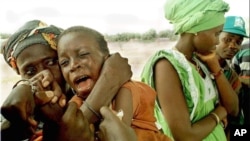DAKAR, SENEGAL —
More than 1.1 million people have been successfully vaccinated against meningitis in eastern Guinea, according to the country’s Ministry of Health, the United Nations Children's Fund and the World Health Organization (WHO).
Health workers in Guinea say the mass vaccination campaign could help stop a deadly outbreak of meningitis, which has claimed at least 52 lives since the first cases were reported in January.
The country had an estimated 400 suspected cases last year, according to the WHO.
Meningitis, which inflames the protective tissue that covers the brain and spinal cord, is passed from person to person by way of bacteria that live in the throat. It most often affects children and young adults. According to the WHO website, symptoms commonly include headaches, high fever and a stiff neck. Meningococcal meningitis, a bacterial form of the illness, can cause severe brain damage and, if untreated, kills half its victims.
Experts say vaccination is the best way to prevent the disease and stop its spread.
“In Guinea, only [around] 35 percent of the children are fully vaccinated,” said Timothy La Rose, spokesman for the U.N. Children’s Fund in Guinea.
La Rose, in an interview with VOA in the capital city of Conakry, said UNICEF had joined with the government, WHO and other partners to launch “a campaign to vaccinate 95 percent of people ages 1 to 29 who live in the affected areas.”
In the ‘meningitis belt’
Guinea lies in the “meningitis belt,” a part of Africa stretching from Senegal in the west to Ethiopia in the east that sees regular outbreaks of the disease.
La Rose said UNICEF and its partners also conducted community awareness campaigns to educate people about meningitis and the importance of getting vaccinated.
Previous vaccination campaigns either have halted or dramatically slowed outbreaks, he said.
Obstacles to campaign
Communicating information is one hurdle in the vaccination campaign. Building sufficient infrastructure is another.
La Rose pointed out that the vaccines generally need to be refrigerated. “You can imagine in a country with electricity problems and infrastructure issues, it can be quite a challenge,” he said, adding it was a challenge “to keep the cold chain strong so that the vaccinations would not expire or go bad during the transport and delivery.”
Incidentally, a pilot program indicated constant refrigeration was not essential for delivering viable meningitis vaccine in rural Africa, JAMA, the Journal of the American Medical Association, reported earlier this year, citing study results published in the journal Vaccine.
La Rose said UNICEF has been working with local health centers to distribute antibiotics to treat children who contract meningitis.
He said UNICEF plans to offer a second round of vaccinations later this year.
Health workers in Guinea say the mass vaccination campaign could help stop a deadly outbreak of meningitis, which has claimed at least 52 lives since the first cases were reported in January.
The country had an estimated 400 suspected cases last year, according to the WHO.
Meningitis, which inflames the protective tissue that covers the brain and spinal cord, is passed from person to person by way of bacteria that live in the throat. It most often affects children and young adults. According to the WHO website, symptoms commonly include headaches, high fever and a stiff neck. Meningococcal meningitis, a bacterial form of the illness, can cause severe brain damage and, if untreated, kills half its victims.
Experts say vaccination is the best way to prevent the disease and stop its spread.
“In Guinea, only [around] 35 percent of the children are fully vaccinated,” said Timothy La Rose, spokesman for the U.N. Children’s Fund in Guinea.
La Rose, in an interview with VOA in the capital city of Conakry, said UNICEF had joined with the government, WHO and other partners to launch “a campaign to vaccinate 95 percent of people ages 1 to 29 who live in the affected areas.”
In the ‘meningitis belt’
Guinea lies in the “meningitis belt,” a part of Africa stretching from Senegal in the west to Ethiopia in the east that sees regular outbreaks of the disease.
La Rose said UNICEF and its partners also conducted community awareness campaigns to educate people about meningitis and the importance of getting vaccinated.
Previous vaccination campaigns either have halted or dramatically slowed outbreaks, he said.
Obstacles to campaign
Communicating information is one hurdle in the vaccination campaign. Building sufficient infrastructure is another.
La Rose pointed out that the vaccines generally need to be refrigerated. “You can imagine in a country with electricity problems and infrastructure issues, it can be quite a challenge,” he said, adding it was a challenge “to keep the cold chain strong so that the vaccinations would not expire or go bad during the transport and delivery.”
Incidentally, a pilot program indicated constant refrigeration was not essential for delivering viable meningitis vaccine in rural Africa, JAMA, the Journal of the American Medical Association, reported earlier this year, citing study results published in the journal Vaccine.
La Rose said UNICEF has been working with local health centers to distribute antibiotics to treat children who contract meningitis.
He said UNICEF plans to offer a second round of vaccinations later this year.




